虚拟语气用法总结(超好)
- 格式:ppt
- 大小:1.09 MB
- 文档页数:16
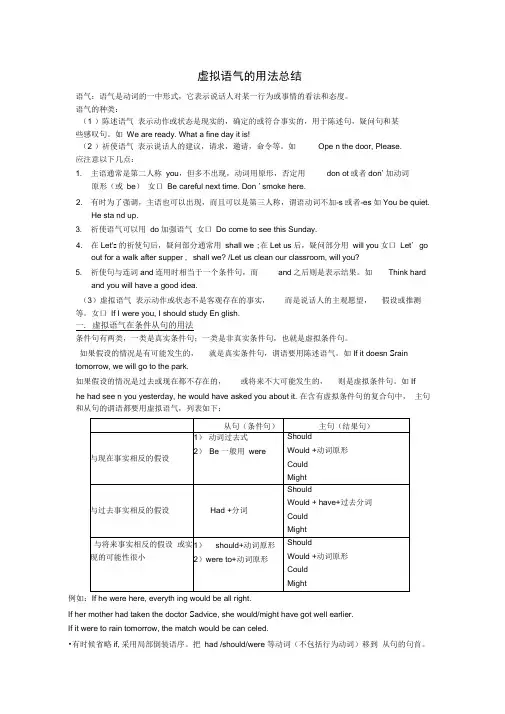
虚拟语气的用法总结语气:语气是动词的一中形式,它表示说话人对某一行为或事情的看法和态度。
语气的种类:(1 )陈述语气表示动作或状态是现实的,确定的或符合事实的,用于陈述句,疑问句和某些感叹句。
如We are ready. What a fine day it is!(2 )祈使语气表示说话人的建议,请求,邀请,命令等。
如Ope n the door, Please.应注意以下几点:1. 主语通常是第二人称you,但多不出现,动词用原形,否定用don ot或者don'加动词原形(或be)女口Be careful next time. Don 'smoke here.2. 有时为了强调,主语也可以出现,而且可以是第三人称,谓语动词不加-s或者-es如You be quiet.He sta nd up.3. 祈使语气可以用do加强语气女口Do come to see this Sunday.4. 在Let's的祈使句后,疑问部分通常用shall we ;在Let us后,疑问部分用will you女口Let' goout for a walk after supper , shall we? /Let us clean our classroom, will you?5. 祈使句与连词and连用时相当于一个条件句,而and之后则是表示结果。
如Think hardand you will have a good idea.(3)虚拟语气表示动作或状态不是客观存在的事实,而是说话人的主观愿望,假设或推测等。
女口If I were you, I should study En glish.一. 虚拟语气在条件从句的用法条件句有两类,一类是真实条件句;一类是非真实条件句,也就是虚拟条件句。
如果假设的情况是有可能发生的,就是真实条件句,谓语要用陈述语气。
如If it doesn S rain tomorrow, we will go to the park.如果假设的情况是过去或现在都不存在的,或将来不大可能发生的,则是虚拟条件句。
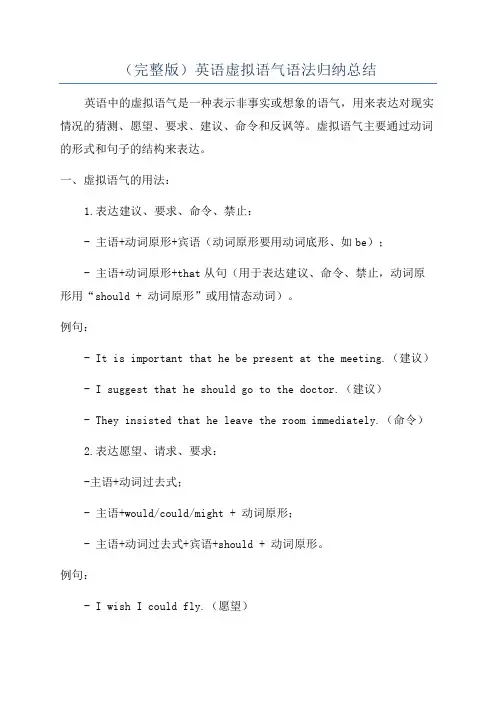
(完整版)英语虚拟语气语法归纳总结英语中的虚拟语气是一种表示非事实或想象的语气,用来表达对现实情况的猜测、愿望、要求、建议、命令和反讽等。
虚拟语气主要通过动词的形式和句子的结构来表达。
一、虚拟语气的用法:1.表达建议、要求、命令、禁止:- 主语+动词原形+宾语(动词原形要用动词底形、如be);- 主语+动词原形+that从句(用于表达建议、命令、禁止,动词原形用“should + 动词原形”或用情态动词)。
例句:- It is important that he be present at the meeting.(建议)- I suggest that he should go to the doctor.(建议)- They insisted that he leave the room immediately.(命令)2.表达愿望、请求、要求:-主语+动词过去式;- 主语+would/could/might + 动词原形;- 主语+动词过去式+宾语+should + 动词原形。
例句:- I wish I could fly.(愿望)- I would appreciate it if you could help me.(请求)3.表示虚拟条件:- If条件从句中的谓语动词用过去完成时,主句用would/should/might/could + have + 过去分词;- If条件从句中的谓语动词用过去时,主句用would/should/could + 动词原形。
例句:- If I had known his phone number, I would have called him.(虚拟条件)- If you had listened to me, we could have finished the project earlier.(虚拟条件)4.表达建议、要求、祝愿:- If only内部称述 + 主语 + 过去式。
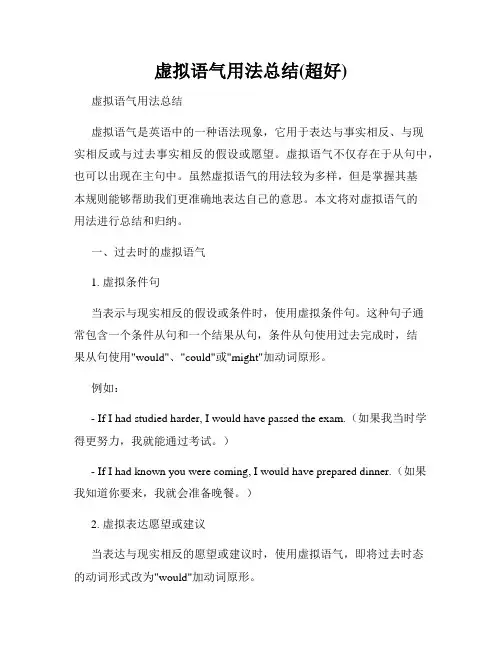
虚拟语气用法总结(超好)虚拟语气用法总结虚拟语气是英语中的一种语法现象,它用于表达与事实相反、与现实相反或与过去事实相反的假设或愿望。
虚拟语气不仅存在于从句中,也可以出现在主句中。
虽然虚拟语气的用法较为多样,但是掌握其基本规则能够帮助我们更准确地表达自己的意思。
本文将对虚拟语气的用法进行总结和归纳。
一、过去时的虚拟语气1. 虚拟条件句当表示与现实相反的假设或条件时,使用虚拟条件句。
这种句子通常包含一个条件从句和一个结果从句,条件从句使用过去完成时,结果从句使用"would"、"could"或"might"加动词原形。
例如:- If I had studied harder, I would have passed the exam.(如果我当时学得更努力,我就能通过考试。
)- If I had known you were coming, I would have prepared dinner.(如果我知道你要来,我就会准备晚餐。
)2. 虚拟表达愿望或建议当表达与现实相反的愿望或建议时,使用虚拟语气,即将过去时态的动词形式改为"would"加动词原形。
例如:- I wish I were taller.(我希望我更高。
)- She suggested that he take a bus.(她建议他坐公交车。
)二、现在时的虚拟语气1. 虚拟条件句与过去时的虚拟条件句类似,现在时的虚拟条件句也包含一个条件从句和一个结果从句。
条件从句使用"were to"结构或"should"加动词原形,结果从句使用"would"、"could"或"might"加动词原形。
例如:- If I were to win the lottery, I would travel the world.(如果我中了彩票,我会周游世界。
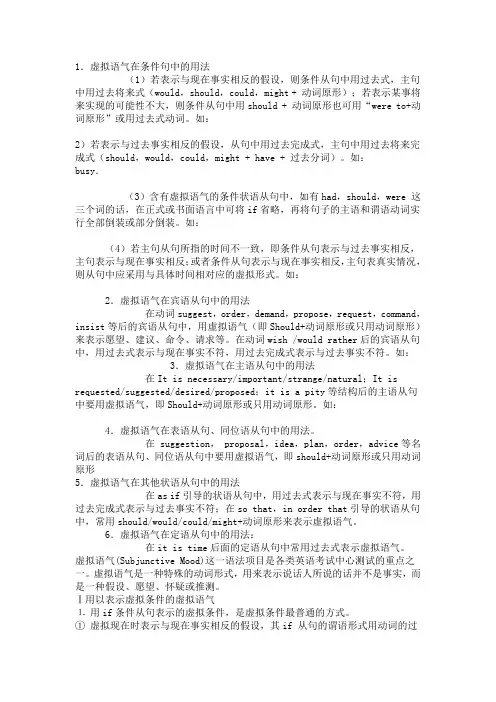
1.虚拟语气在条件句中的用法(1)若表示与现在事实相反的假设,则条件从句中用过去式,主句中用过去将来式(would,should,could,might + 动词原形);若表示某事将来实现的可能性不大,则条件从句中用should + 动词原形也可用“were to+动词原形”或用过去式动词。
如:2)若表示与过去事实相反的假设,从句中用过去完成式,主句中用过去将来完成式(should,would,could,might + have + 过去分词)。
如:busy.(3)含有虚拟语气的条件状语从句中,如有had,should,were 这三个词的话,在正式或书面语言中可将if省略,再将句子的主语和谓语动词实行全部倒装或部分倒装。
如:(4)若主句从句所指的时间不一致,即条件从句表示与过去事实相反,主句表示与现在事实相反;或者条件从句表示与现在事实相反,主句表真实情况,则从句中应采用与具体时间相对应的虚拟形式。
如:2.虚拟语气在宾语从句中的用法在动词suggest,order,demand,propose,request,command,insist等后的宾语从句中,用虚拟语气(即Should+动词原形或只用动词原形)来表示愿望、建议、命令、请求等。
在动词wish /would rather后的宾语从句中,用过去式表示与现在事实不符,用过去完成式表示与过去事实不符。
如:3.虚拟语气在主语从句中的用法在It is necessary/important/strange/natural;It is requested/suggested/desired/proposed;it is a pity等结构后的主语从句中要用虚拟语气,即Should+动词原形或只用动词原形。
如:4.虚拟语气在表语从句、同位语从句中的用法。
在 suggestion, proposal,idea,plan,order,advice等名词后的表语从句、同位语从句中要用虚拟语气,即should+动词原形或只用动词原形5.虚拟语气在其他状语从句中的用法在as if引导的状语从句中,用过去式表示与现在事实不符,用过去完成式表示与过去事实不符;在so that,in order that引导的状语从句中,常用should/would/could/might+动词原形来表示虚拟语气。
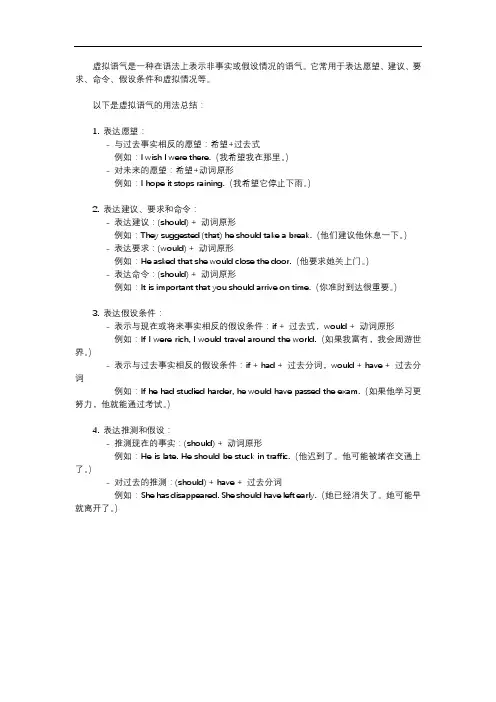
虚拟语气是一种在语法上表示非事实或假设情况的语气。
它常用于表达愿望、建议、要求、命令、假设条件和虚拟情况等。
以下是虚拟语气的用法总结:1. 表达愿望:- 与过去事实相反的愿望:希望+过去式例如:I wish I were there.(我希望我在那里。
)- 对未来的愿望:希望+动词原形例如:I hope it stops raining.(我希望它停止下雨。
)2. 表达建议、要求和命令:- 表达建议:(should) + 动词原形例如:They suggested (that) he should take a break.(他们建议他休息一下。
)- 表达要求:(would) + 动词原形例如:He asked that she would close the door.(他要求她关上门。
)- 表达命令:(should) + 动词原形例如:It is important that you should arrive on time.(你准时到达很重要。
)3. 表达假设条件:- 表示与现在或将来事实相反的假设条件:if + 过去式,would + 动词原形例如:If I were rich, I would travel around the world.(如果我富有,我会周游世界。
)- 表示与过去事实相反的假设条件:if + had + 过去分词,would + have + 过去分词例如:If he had studied harder, he would have passed the exam.(如果他学习更努力,他就能通过考试。
)4. 表达推测和假设:- 推测现在的事实:(should) + 动词原形例如:He is late. He should be stuck in traffic.(他迟到了。
他可能被堵在交通上了。
)- 对过去的推测:(should) + have + 过去分词例如:She has disappeared. She should have left early.(她已经消失了。
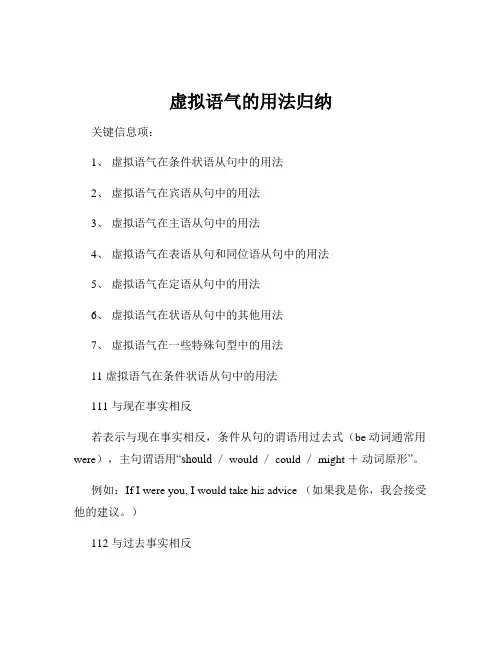
虚拟语气的用法归纳关键信息项:1、虚拟语气在条件状语从句中的用法2、虚拟语气在宾语从句中的用法3、虚拟语气在主语从句中的用法4、虚拟语气在表语从句和同位语从句中的用法5、虚拟语气在定语从句中的用法6、虚拟语气在状语从句中的其他用法7、虚拟语气在一些特殊句型中的用法11 虚拟语气在条件状语从句中的用法111 与现在事实相反若表示与现在事实相反,条件从句的谓语用过去式(be 动词通常用were),主句谓语用“should / would / could / might +动词原形”。
例如:If I were you, I would take his advice (如果我是你,我会接受他的建议。
)112 与过去事实相反若表示与过去事实相反,条件从句的谓语用过去完成式(had +过去分词),主句谓语用“should / would / could / might + have +过去分词”。
比如:If you had come earlier, you would have caught the bus (如果你早点来,你就赶上公交车了。
)113 与将来事实相反若表示与将来事实相反,条件从句的谓语有三种形式:过去式(be 动词通常用 were)should +动词原形were to +动词原形主句谓语用“should / would / could / might +动词原形”。
例如:If it were to rain tomorrow, we would stay at home (如果明天下雨,我们就待在家里。
)12 虚拟语气在宾语从句中的用法121 wish 后的宾语从句wish 后的宾语从句要用虚拟语气。
与现在事实相反,用一般过去时;与过去事实相反,用过去完成时;与将来事实相反,用“would / could +动词原形”。
例如:I wish I were as tall as you (我希望和你一样高。
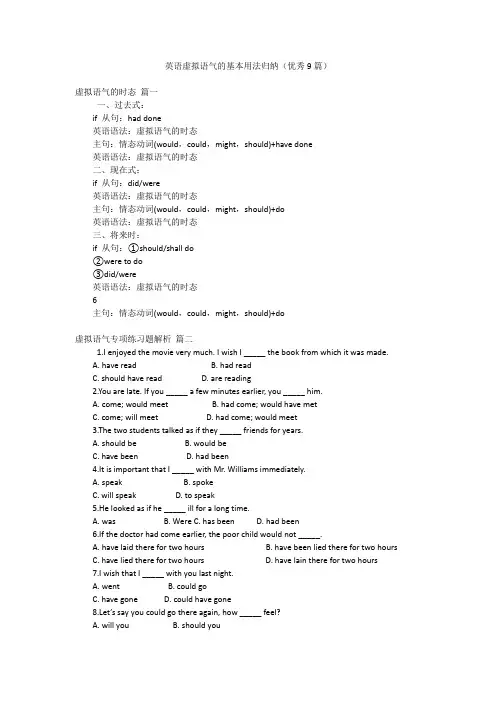
英语虚拟语气的基本用法归纳(优秀9篇)虚拟语气的时态篇一一、过去式:if 从句:had done英语语法:虚拟语气的时态主句:情态动词(would,could,might,should)+have done英语语法:虚拟语气的时态二、现在式:if 从句:did/were英语语法:虚拟语气的时态主句:情态动词(would,could,might,should)+do英语语法:虚拟语气的时态三、将来时:if 从句:①should/shall do②were to do③did/were英语语法:虚拟语气的时态6主句:情态动词(would,could,might,should)+do虚拟语气专项练习题解析篇二1.I enjoyed the movie very much. I wish I _____ the book from which it was made.A. have readB. had readC. should have readD. are reading2.You are late. If you _____ a few minutes earlier, you _____ him.A. come; would meetB. had come; would have metC. come; will meetD. had come; would meet3.The two students talked as if they _____ friends for years.A. should beB. would beC. have beenD. had been4.It is important that I _____ with Mr. Williams immediately.A. speakB. spokeC. will speakD. to speak5.He looked as if he _____ ill for a long time.A. wasB. WereC. has beenD. had been6.If the doctor had come earlier, the poor child would not _____.A. have laid there for two hoursB. have been lied there for two hoursC. have lied there for two hoursD. have lain there for two hours7.I wish that I _____ with you last night.A. wentB. could goC. have goneD. could have gone8.Let’s say you could go there again, how _____ feel?A. will youB. should youC. would youD. do you9.I can’t stand him. He always talks as though he _____ everything.A. knewB. knowsC. has knownD. had known10._____ the fog, we should have reached our school.A. Because ofB. In spite ofC. In case ofD. But for11.If you had told me in advance, I _____ him at the airport.A. would meetB. would had metC. would have metD. would have meet12.Mike can take his car apart and put it back together again. I certainly wish he_____ me how.A. teachesB. will teachC. has taughtD. would teach13.I would have told him the answer, had it been possible, but I _____ so busy then.A. had beenB. wereC. wasD. would be14.He’s working hard for fear that he _____.A. should fall behindB. fell behindC. may fall behindD. would fallen behind15.If it _____ another ten minutes, the game would have been called off.A. had rainedB. would have rainedC. have seenD. rained16.He suggested that they _____ use a trick instead of fighting.A. shouldB. wouldC. doD. had17.My father did not go to New York; the doctor suggested that he _____ there.A. not wentB. won’t goC. not goD. not to go18.I would have gone to the meeting if I _____ time.A. had hadB. have hadC. hadD. would have had19.Would you rather I _____ buying a new bike?A. decided againstB. will decide againstC. have decidedD. shall decide against20.You look so tired tonight. It is time you _____.A. go to sleepB. went to sleepC. go to bedD. went to bed21、—Why didn’t you buy a new car?—I would have bought one if I _____ enough money.A. hadB. have hadC. would haveD. had had22.If she could sew, _____.A. she make a dressB. she would have made a shirtC. she will make a shirtD. she would had made a coat23._____ today, he would get there by Friday.A. Would he leaveB. Was he leavingC. Were he to leaveD. If he leaves24.His doctor suggested that he _____ a short trip abroad.A. will takeB. would takeC. takeD. took25.The Bakers arrived last night. If they’d only let us know earlier,_____ at the station.A. we’d meet themB. we’ll meet themC. we’d have met themD. we’ve met them26.If I _____ you, I _____ more attention to English idioms and phrases.A. was; shall payB. am; will payC. would be; would payD. were; would pay27.We might have failed if you _____ us a helping hand.A. have not givenB. would not giveC. had not givenD. did not give28.The law requires that everyone _____ his car checked at least once a year.A. hasB. hadC. haveD. will have29.It is strange that he _____ so.A. would sayB. would speakC. should sayD. will speak30.Had I known her name, _____A. or does she know mine?B. and where does she live?C. she would be beautiful.D. I would have invited her to lunch.31.He has just arrived, but he talks as if he _____ all about that.A. knowB. knowsC. knownD. knew32.If I _____ the money, I would have bought a much bigger car.A. possessedB. ownedC. hadD. had had33.He was very busy yesterday; otherwise, he _____ to the meeting.A. would comeB. cameC. would have comeD. will come34.The librarian insists that John _____ no more books from the library before he returns all the books he has borrowed.A. will takeB. tookC. takeD. takes35.I left very early last night, but I wish I _____ so early.A. didn’t leaveB. hadn’t leftC. haven’t leftD. couldn’t leave36.I do not have a job. I would find one but I _____ no time.A. hadB. didn’t haveC. had hadD. have37.I wish that you _____ such a bad headache because I’m sure that you would have enjoyed the concert.A. hadn’tB. didn’t have hadC. hadn’t hadD. hadn’t have38.He insisted that we all _____ in his office at one o’clock.A. beB. to beC. would beD. shall be39.Helen couldn’t go to France after all. That’s too bad. I’m sure she would have enjoyed it if _____.A. she’s goneB. she’ll goC. she’d goneD. she’d go答案:1—5 BBDAD 6—10 DDCAD11—15 CDCAA 16—20 ACAAD21—25 DBCCC 26—30 DCCCD31—35 DDCCB 36—39 DCAC解析:1.wish后面用虚拟语气,表示与过去事实相反用过去完成时。
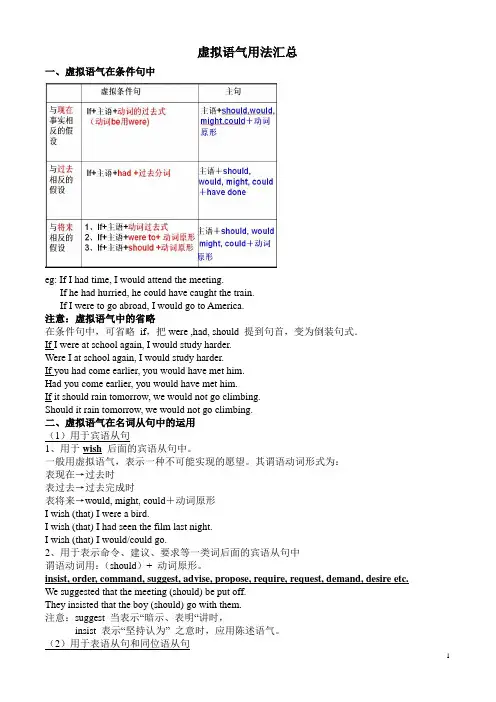
虚拟语气用法汇总一、虚拟语气在条件句中eg: If I had time, I would attend the meeting.If he had hurried, he could have caught the train.If I were to go abroad, I would go to America.注意:虚拟语气中的省略在条件句中,可省略if,把were ,had, should 提到句首,变为倒装句式.If I were at school again, I would study harder.Were I at school again, I would study harder.If you had come earlier, you would have met him.Had you come earlier, you would have met him.If it should rain tomorrow, we would not go climbing.Should it rain tomorrow, we would not go climbing.二、虚拟语气在名词从句中的运用(1)用于宾语从句1、用于wish后面的宾语从句中。
一般用虚拟语气,表示一种不可能实现的愿望。
其谓语动词形式为:表现在→过去时表过去→过去完成时表将来→would, might, could+动词原形I wish (that) I were a bird.I wish (that) I had seen the film last night.I wish (that) I would/could go.2、用于表示命令、建议、要求等一类词后面的宾语从句中谓语动词用:(should)+ 动词原形。
insist, order, command, suggest, advise, propose, require, request, demand, desire etc. We suggested that the meeting (should) be put off.They insisted that the boy (should) go with them.注意:suggest 当表示“暗示、表明“讲时,insist 表示“坚持认为”之意时,应用陈述语气。
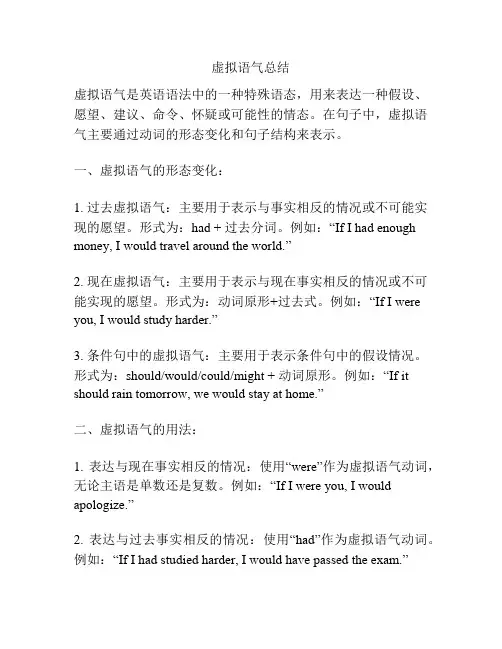
虚拟语气总结虚拟语气是英语语法中的一种特殊语态,用来表达一种假设、愿望、建议、命令、怀疑或可能性的情态。
在句子中,虚拟语气主要通过动词的形态变化和句子结构来表示。
一、虚拟语气的形态变化:1. 过去虚拟语气:主要用于表示与事实相反的情况或不可能实现的愿望。
形式为:had + 过去分词。
例如:“If I had enough money, I would travel around the world.”2. 现在虚拟语气:主要用于表示与现在事实相反的情况或不可能实现的愿望。
形式为:动词原形+过去式。
例如:“If I were you, I would study harder.”3. 条件句中的虚拟语气:主要用于表示条件句中的假设情况。
形式为:should/would/could/might + 动词原形。
例如:“If it should rain tomorrow, we would stay at home.”二、虚拟语气的用法:1. 表达与现在事实相反的情况:使用“were”作为虚拟语气动词,无论主语是单数还是复数。
例如:“If I were you, I would apologize.”2. 表达与过去事实相反的情况:使用“had”作为虚拟语气动词。
例如:“If I had studied harder, I would have passed the exam.”3. 表达不可能实现的愿望:使用虚拟语气动词的适当形式来表示愿望、建议或命令。
例如:“I wish I were taller.” “If only I could speak French.” “She demanded that he leave immediately.”4. 表达估计、推测、怀疑或建议:使用虚拟语气动词的适当形式来表示可能性。
例如:“It is important that he arrive on time.” “She suggested that we go to the cinema.”三、虚拟语气的注意事项:1. 注意一致性:在条件从句中,主句和从句的动词形式要保持一致。
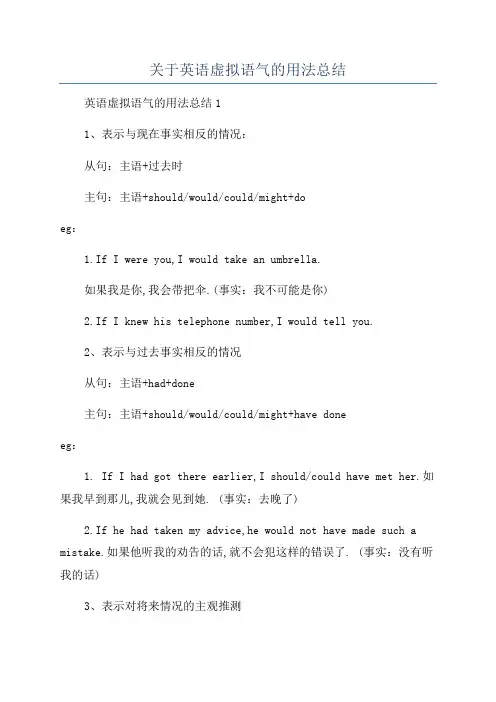
关于英语虚拟语气的用法总结英语虚拟语气的用法总结11、表示与现在事实相反的情况:从句:主语+过去时主句:主语+should/would/could/might+doeg:1.If I were you,I would take an umbrella.如果我是你,我会带把伞.(事实:我不可能是你)2.If I knew his telephone number,I would tell you.2、表示与过去事实相反的情况从句:主语+had+done主句:主语+should/would/could/might+have doneeg:1. If I had got there earlier,I should/could have met her.如果我早到那儿,我就会见到她. (事实:去晚了)2.If he had taken my advice,he would not have made such a mistake.如果他听我的劝告的话,就不会犯这样的错误了. (事实:没有听我的话)3、表示对将来情况的主观推测从句:主句①if+主语+were to do :①主语+should/would/could/might+do②if+主语+did/were ②主语+should/would/could/might+do③if+主语+should+do ③主语+should/would/could/might+doeg:如果他明天来这儿的话,我就跟他谈谈.(事实:来的可能性很小)2.If there were a heavy snow next Sunday,we would not go skating.如果下周日下大雪,我们就不能去滑冰了.(事实:不知能否下雪)3.If she were to be here next Monday,I would tell her about the matter.如果她下周一来这儿的话,我就会告诉她这件事的始末.英语虚拟语气的用法总结2第一部分:语气的定义和种类1 语气(mood)语气是动词的一种形式,表示说话人对其中一行为或事情的看法和态度。
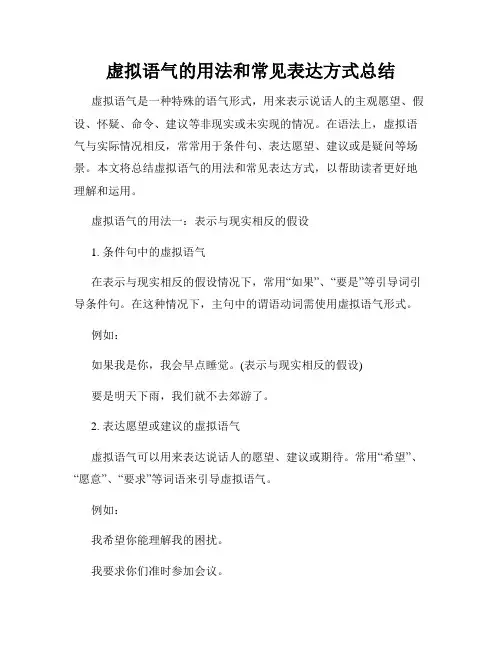
虚拟语气的用法和常见表达方式总结虚拟语气是一种特殊的语气形式,用来表示说话人的主观愿望、假设、怀疑、命令、建议等非现实或未实现的情况。
在语法上,虚拟语气与实际情况相反,常常用于条件句、表达愿望、建议或是疑问等场景。
本文将总结虚拟语气的用法和常见表达方式,以帮助读者更好地理解和运用。
虚拟语气的用法一:表示与现实相反的假设1. 条件句中的虚拟语气在表示与现实相反的假设情况下,常用“如果”、“要是”等引导词引导条件句。
在这种情况下,主句中的谓语动词需使用虚拟语气形式。
例如:如果我是你,我会早点睡觉。
(表示与现实相反的假设)要是明天下雨,我们就不去郊游了。
2. 表达愿望或建议的虚拟语气虚拟语气可以用来表达说话人的愿望、建议或期待。
常用“希望”、“愿意”、“要求”等词语来引导虚拟语气。
例如:我希望你能理解我的困扰。
我要求你们准时参加会议。
3. 表示命令、建议或要求的虚拟语气虚拟语气可以在表示命令、建议或要求时使用,常用“要求”、“建议”、“命令”等引导词来引导虚拟语气。
例如:我建议你明天早点来上班。
我命令你立刻停止打架。
虚拟语气的用法二:表示对过去事件的假设1. 表示对过去事件的虚拟语气虚拟语气在表示对过去事件的假设时,常通过使用“如果”加上过去完成时的虚拟语气。
例如:如果我当初选了理科,现在就不会后悔了。
要是我没有迟到,老师就不会生气了。
2. 表示对过去行为的懊悔与后悔当我们对过去的行为感到懊悔或后悔时,可以使用虚拟语气来表达这种情绪。
例如:要是我早点听从父母的劝告,就不会犯那么多错误了。
虚拟语气的用法三:表示建议、要求或推测1. 表示建议、要求或推测的虚拟语气虚拟语气可以用来表示建议、要求或推测的情况。
常用“要求”、“建议”、“推测”等引导词语来引导虚拟语气。
例如:我建议你今天早点休息。
我推测他可能已经离开了。
2. 表示对不可能实现的要求虚拟语气也可以用于表示对不可能实现的要求。
常用“要求”、“期望”等引导词语来引导虚拟语气。
虚拟语气的用法和注意事项虚拟语气是指在表达假设、愿望、建议、命令等非真实情况时所使用的一种语气。
它能够帮助我们表达一些与现实情况相反或者未实现的想法。
在日常生活和学术写作中,正确地使用虚拟语气将使我们的语言更加准确、严谨。
本文将介绍虚拟语气的常见用法,并提供一些需要注意的事项。
一、虚拟语气的用法:1. 虚拟条件句:虚拟条件句用来表达与现实相反或未实现的假设情况。
其中,谓语动词常用“would”或“should”来表示假设的情况。
例如:- If I were a bird, I would fly in the sky.(如果我是一只鸟,我就会在天空飞翔。
)- If it hadn't rained, we should have gone for a picnic.(如果没有下雨,我们本来会去野餐。
)2. 虚拟愿望句:虚拟愿望句用来表达一种未实现的愿望或者希望。
常用动词如“wish”,“hope”,“desire”等。
例如:- I wish I could speak fluent French.(我希望我能够流利地说法语。
)- She desires that her parents would understand her better.(她希望她的父母能更好地理解她。
)3. 虚拟建议句:虚拟建议句用来表达建议、要求等非真实情况。
常用动词如“suggest”,“recommend”,“request”等。
例如:- I suggest that he go to bed early to get enough rest.(我建议他早点睡觉以获得足够的休息。
)- The boss requested that all employees be punctual for the meeting.(老板要求所有员工在会议上准时到达。
)二、虚拟语气的注意事项:1. 在虚拟条件句中,如果假设是与现在事实相反的情况,谓语动词用过去式;如果假设是与过去事实相反的情况,谓语动词则用过去完成式。
虚拟语气用法总结大全一.虚拟语气在非真实条件句中二.虚拟语气在名词从句中1.在由suggest, demand, require, request, insist, order, command, propose等表示建议、请求、命令、愿望等动词或其同根词引出的名词从句中,名词从句虚拟句的谓语变化的形式只有一条规律——名词从句虚拟句无论其主句的谓语动词时何种形式,从句的谓语形式均为should+动词原形,其中should可以省三.虚拟语气的其他用法省一.虚拟语气在非真实条件句中1. — If the traffic hadn't been so heavy, I could have been back by 6 o'clock.—What a pity! Tina ______ here to see you. (2005 湖南)A. isB. wasC. would beD. has been2. It is hard for me to imagine what I would be doing today if I ______ in love, at the age of seven, with the Melinda Cox Library in my hometown. (2002 上海)A. wouldn't have fallenB. had not fallenC. should fallD. were to fall3. He hesitated(犹豫)for a moment before kicking the ball, otherwise he ______ a goal. (2001 上海春)A. had scoredB. scoredC. would scoreD. would have scored4. You didn't let me drive. If we _____in turn, you_____ so tired. (NMET96)A. drove; didn't getB. drove; wouldn't getC. were driving; wouldn't getD. had driven; wouldn't have got5. I didn't see your sister at the meeting. If she ______, she would have met my brother. (1994全国)A. has comeB. did comeC. cameD. had come6. -----If he__________, he __________that food.------Luckily he was sent to the hospital immediately. (MET93)A. was warned; would not takeB. had been warned; would not have takenC. would be warned; would not have takenD. would have been warned; had not taken7. If it_____ for the snow, we_____ the mountain yesterday. (MET91)A. were not; could have climbedB. were not; could climbC. had not been; could have climbedD. had not been; could climb8. Without electricity human life____ quite different today. (MET91)A. isB. will beC. would have beenD. would be11. --- Pity you missed the lecture on nuclear pollution.--- I it, but I was busy preparing for a job interview. (福建34’)A. attendedB. had attendedC. would attendD. would have attended12. I _______ through that bitter period without your generous help. ( 陕西22’)A. couldn’t have goneB. didn’t goC. wouldn’t goD. hadn’t gone13. I ______ sooner but I didn’t know that they we re waiting for me. (天津15’)A. had comeB. was comingC. would comeD. would have come14. I would have gone to visit him in the hospital had it been at all possible, but I fully occupied the whole of last week.A. wereB. had beenC. have beenD. was16. Had I known about this computer program, a huge amount time and energy .(2010浙江)A. would have been savedB. had been savedC. will be savedD. was saved17. ---- The weather has been very hot and dry.---- Yes. If it had rained even a drop, things would be much better now! And my vegetables .(2010北京)A. wouldn’t dieB. didn’t dieC. hadn’t diedD. wouldn’t have died18. If we the other road, we might have arrived here in time for the meeting. (2010湖南)A .followedB .should follow C. had followed D. would follow20. This printer is of good quality. If it _______ break down within the first year, we would repair it at our expense. (09天津15) A. would B. should C. could D. might 21. ------ Did you go to his wedding ceremony yesterday ? ------- No. But I would if I had been free. (改错) 二.虚拟语气在名词从句中1. — Where are the children? T he dinner’s going to be completely ruined.— I wish they always late. (北京28’)A. weren’tB. hadn’t beenC. wouldn’t beD. wouldn’t have been2. ______ in the regulations that you should not tell other people the password of your e-mail account. (05 上海)A. What is requiredB. What requiresC. It is requiredD. It requires3. —— Don't you think it necessary that he ______ to Miami but to New York?—— I agree, but the problem is ______ he has refused to. (2005 江苏)A. will not be sent; thatB. not be sent; thatC. should not be sent; whatD. should not send; what4.①The chairman suggested that the meeting _________________(put off) until the next week.②The look on his face suggested that he ____________(be) angry with what you did.5. Thank you for all your hard work last week. I don’t think we it without you. (08山东)A. can manageB. could have managedC. could manageD. can have managed6. The doctor recommended that you ____swim after eating a large meal.A. wouldn’tB. couldn’tC. needn’tD. shouldn’t (09浙江13)7.①The man in prison insisted that he _________nothing wrong and _________set free.A. had done, should beB. should do, should beC. had done, had beenD. should do, had b een②The patient insisted that he _________ill and _________to the hospital.A. wasn’t, wasn’t sentB. wasn’t, shouldn’t be sentC. shouldn’t be, wasn’t sentD. shouldn’t be, shouldn’t be se nt8.The workers demanded that their wages ___by 20 percent.A. raisedB. raiseC. should have been raisedD. be raised9. At the meeting everybody was against his suggestion that a new bridge ___over the river.A. be builtB. must be builtC. was to be builtD. had to be built10. It is politely requested by the hotel manager that radios ___after 11 o’clock at night.A. were not playedB. not be playedC. not to playD. did not play11. It is essential(必要的,重要的) that the books you borrowed from the library ___back before thedeadline(截止日期).A. be sentB. would be sentC. were sentD. must be sent三.虚拟语气的其他用法1. Look at the terrible situation I am in! If only I ___your advice.A. followB. had followedC. would followD. have followed2. Without the air to hold some of the sun's heat, the earth at night ______, too cold for us to live. (97 上海)A. would be freezing coldB. will be freezing coldlyC. would be frozen coldD. can freeze coldly3. It is necessary ___the dictionary immediately.A. that he will returnB. that he returnedC. that he returnD. that he has to return4. It’s already five o’clock now. Do you think it’s about time ___?A. we are going homeB. we go homeC. we went homeD. we can go home5. It ‘s high time you ___that you are not the most important person in the worldA. realizedB. have realizedC. realizeD. should be realizing6. You don’t have to be in such a hurry. I would rather you ___on business first.A. would goB. will goC. wentD. have gone7. George is going to talk about the geography of his country, but I’d rather he more on its culture.A .focus B. focused C. would focus D. had focused(2010江苏)8. I have watched that movie——it’ll give me horrible dreams.A. shouldn’tB. needn’tC. couldn’tD. mustn’t (2010山东)9. But for their help, we ___ the program in time. (09安徽34)A. can not finishB. will not finishC. had not finishedD. could not have finished10. But for the help of my English teacher, I ____ the first prize in the English Writing Competition.A. would not winB. would not have wonC. would winD. would have won (09福建35)11. What a pity? Considering his ability and experience, he better. (08江西)A. need have doneB. must have doneC. can have doneD. might have done12. If it were not for the fact that she _____ sing, I would invite her to the party. (2006 福建)A. couldn’tB. couldC. can’tD. might not13. ______ fired, your health care and other benefits would be immediately cut off.(2006 湖北)A. Would you beB. Should you beC. Could you beD. Might you be14. When a pencil is partly in a glass of water, it looks as if it ______. (1995 全国)A. breaksB. has brokenC. were brokenD. had been broken15. ______for the free tickets, I would not have gone to the films often. (1995 上海)A. If it is notB. Were it notC. Had it not beenD. If they were not16. What would have happened _________ , as far as the river bank? (NMET 2001 上海)A. Bob had walked fartherB. if Bob should walk fartherC. had Bob walked farther C. if Bob walked farther。
虚拟语气常在表示条件和结果的状语从句中。
在表示与事实相反的虚拟语气时动词有三种时态:现在时,过去时,将来时。
在条件句中的应用:条件句可分为两类,一类为真实条件句,一类为非真实条件句。
非真实条件句表示的是假设的或实际可能性不大的情况,故采用虚拟语气。
虚拟语气在什么情况下用虚拟语气在表示虚假的、与事实相反的或难以实现的情况时,用虚拟语气,表示主观愿望或表示某种强烈情感时,也用虚拟语气。
[编辑本段]虚拟语气在非真实条件状语从句中的用法1、真实条件状语从句与非真实条件状语从句eg .If he doesn’t hurry up, he will miss the bus. 如果他不快点,他将错过巴士。
( 真实条件状语)(不是虚拟语气)If he is free, he will ask me to tell stories. 如果他是空闲的,他会要求我讲故事。
(真实条件状语)(不是虚拟语气)If I were you, I would go at once.如果我是你,我马上就会去。
(非真实条件状语从句)If there were no air, people would die. 如果没有空气,人就会死亡。
(非真实条件状语从句)2、在非真实条件状语从句中的用法及动词形式1、表示与现在事实相反的情况:if+主语+did/be(were)+其他+主语+should/would/could/might+do+其他例:1.If I were you, I would take an umbrella.如果我是你,我会带把伞。
(事实:我不可能是你)2.If I knew his telephone number, I would tell you. 如果我知道他的电话号码,我就会告诉你。
(事实:不知道)3.If there were no air or water, there would be no living things on the earth. 如果没有水和空气,地球上就不会有生物。
虚拟语气(the subjunctive mood)用法归纳第一部分:语气的定义和种类1、语气(mood)语气是动词的一种形式,表示说话人对某一行为或事情的看法和态度。
2、语气的种类⑴陈述语气:表示动作或状态是现实的、确定的或符合事实的,用于陈述句、疑问句和某些感叹句。
如:①There are two sides to every question. 每个问题都有两个方面。
②Were you busy all day yesterday? 昨天一整天你都很忙吗?③How good a teacher she is! 她是多好的一位老师啊!⑵祈使语气:表示说话人对对方的请求或命令。
如:①Never be late again! 再也不要迟到了。
②Don’t forget to turn off the light. 别忘了关灯。
⑶虚拟语气:表示动作或状态不是客观存在的事实,而是说话人的主观愿望、假设或推测等。
如:①If I were a bird, I could fly in the air. 如果我是一只小鸟,我就能在空中飞行。
②I wish I could pass the examination. 我希望我能通过考试。
③May you succeed! 祝您成功!第二部分:简单句中的虚拟语气一、情态动词的过去式用于现在时态时,表示说话人的谦虚、客气、有礼貌、或委婉的语气,常用于日常会话中。
如:⑴Would you be kind enough to show me the way to the post office?请你告诉我去邮局的路好吗?⑵It would be better for you not to stay up too late. 你最好别熬夜到很晚。
二、表祝愿。
1、常用“may+动词原形”表示祝愿,但愿,may须置于句首(多用于正式文体中)。
如:⑴May good luck be yours! 祝你好运!⑵May you be happy! 祝你快乐!⑶May you do even better! 祝你取得更大成就!⑷May you have a good time. 祝愿你玩的痛快。
英语虚拟语气语法总结虚拟语气常常使学习英语的人感到困惑。
它需要我们以想象的方式来表达一种与事实不符的情况或假设。
在这篇文章中,我们将对英语虚拟语气进行总结并提供一些实用的例子。
一、虚拟语气的形式和用法虚拟语气的形式主要有:1. 过去式虚拟:用于表示与现在事实相反的情况。
例如:"If I were rich, I would buy a yacht."(如果我富有,我会买一艘游艇。
)2. 过去完成式虚拟:用于表示与过去事实相反的情况。
例如:"If she had studied harder, she would have passed the exam."(如果她学得更努力,她本来会通过考试的。
)3. 条件句中的虚拟语气:用于表示与现在或将来事实相反的情况。
例如:"If I had more time, I would go on a vacation."(如果我有更多时间,我会去度假。
)4. 愿望虚拟语气:用于表示对目前或过去情况的希望、期待。
例如:"I wish I were taller."(但事实是我并不高。
)二、虚拟语气的用法详解1. 表示虚拟条件的句子虚拟条件句常常由“if”引导,其中包含一个假设性的陈述。
在这种情况下,我们使用过去时态来表示与现在事实相反的情况。
例如:"If Iwere you, I would apologize."(如果我是你,我会道歉。
)这里的“were”是过去式虚拟的一种形式,用来表示与现实情况不符的假设。
2. 表示与过去事实相反的虚拟语气过去完成式虚拟经常出现在假设条件中。
例如:"If she had told him the truth, he wouldn't have been angry."(如果她告诉了他真相,他不会生气。
虚拟语气常在表示条件和结果的状语从句中。
在表示与事实相反的虚拟语气时动词有三种时态:现在时,过去时,将来时。
在中的应用:条件句可分为两类,一类为真实条件句,一类为非真实条件句。
非真实条件句表示的是假设的或实际可能性不大的情况,故采用虚拟语气。
虚拟语气在什么情况下用虚拟语气在表示虚假的、与事实相反的或难以实现的情况时,用虚拟语气,表示主观愿望或表示某种强烈情感时,也用虚拟语气。
[]虚拟语气在非真实条件状语从句中的用法1、真实条件状语从句与非真实条件状语从句eg .If he doesn’t hurry up, he will miss the bus. 如果他不快点,他将错过巴士。
( 真实条件状语)(不是虚拟语气)If he is free, he will ask me to tell stories. 如果他是空闲的,他会要求我讲故事。
(真实条件状语)(不是虚拟语气)If I were you, I would go at once.如果我是你,我马上就会去。
(非真实条件状语从句)If there were no air, people would die. 如果没有空气,人就会死亡。
(非真实条件状语从句)2、在非真实条件状语从句中的用法及动词形式1、表示与现在事实相反的情况:if+主语+did/be(were)+其他+主语+should/would/could/might+do+其他例:1.If I were you, I would take an umbrella.如果我是你,我会带把伞。
(事实:我不可能是你)2.If I knew his telephone number, I would tell you. 如果我知道他的电话号码,我就会告诉你。
(事实:不知道)3.If there were no air or water, there would be no living things on the earth. 如果没有水和空气,地球上就不会有生物。